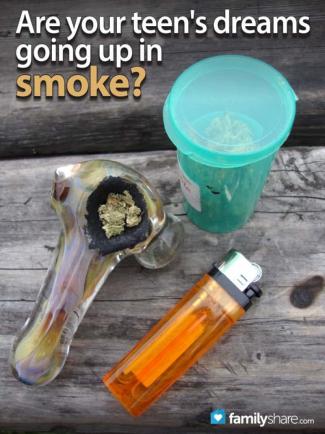
It's every parent's nightmare.
Perhaps you've had your suspicions for a while. So, you checked her room. Maybe you were just putting away your daughter's socks. But there it is. A little baggie with a distinct smell and paraphernalia that looks like it could have been used in science class. You are devastated, hurt, confused and embarrassed.
Your child is using drugs.
Your mind races. You want to confront her, yell at her, ground her for life or kick her out of the house.
Not so fast. First of all, recognize that you're not alone. Drug use among teens has been growing largely due to the increased popularity of marijuana. The National Institute of Health NIH reports that over 1/3 of high school seniors are using marijuana. Marijuana continues to be a gateway to other drugs.
Try to keep your emotions under control. Anger, resentment, guilt and a sense of failure are all common reactions. But it is important to avoid self-blame. Recognize that drug abuse occurs in families of all economic and social backgrounds, as well as happy and unhappy homes. Your teen's using does not reflect on you, your family or your parenting.
Dr. James DeReda, Ph.D. recommends you remember the "3 C's"�:
-
You didn't cause this.
-
You can't control it.
-
You can't cure it.
What you can do, however, is love and help your child. The faster you act, the sooner your teen can become well again. Here are some things you can do.
Have a conversation with your teen
Wait until he is sober before talking with him. Do not approach from a place of anger but of love, concern and a desire to help. Separate the behavior from the child. Be understanding, firm and supportive. Avoid being sarcastic, placing blame, or judging.
Your teen might try to turn the tables and accuse you of invading his privacy. Do not let him distract you. Remind him that you are the parent. This is your home. Let your child know that this is a problem. However, you will work together to fix it.
Get help
Is your teen addicted, or is he only using socially? I don't know, and neither do you. Unfortunately, it is unlikely your teen will confess the full extent of his drug use when caught. It is important to get help.
Call your family physician. Ask if she has experience with adolescents and drug use. If not, ask for a referral to someone who can help. You will want your child to have a complete assessment to identify the extent of the problem.
Craft a plan
Based on the recommendations of your doctor, decide on a plan to help your teen overcome his drug abuse. If he is addicted, decide on which type of treatment program would be best for him. If he is using more casually, then you will want to develop a behavior plan that will hold him accountable for his actions. Make sure there are clear expectations, monitoring and consequences. Visit Time to Act to help create an effective plan for your teen.
Follow up with counseling
Katherine Ketcham from Empowering Parents points out that up to 50 percent of drug abusers also have a co-occurring mental health disorder. Professional counseling can help your teen deal with the anxiety, stress or depression that led her to begin using in the first place.
Consider counseling for the whole family. Your other children might be having a hard time coping with their emotions, too. They might be worried for their sister, or they might feel jealous of all the attention she is getting. You and your spouse might appreciate the support of other parents in your situation. Project Know suggests several programs that might be helpful to you and your family.
Yes, you might have a long road ahead of you. But you're a strong parent. You were made for this. You love your child and would do anything to help him. The good news is that you don't have to do this alone.

